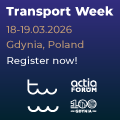The discussions at Ports 4.0 conference in Riga, Latvia, included the impact and future of digitalization, as well as possible challenges the sector needs to overcome in order to remain competitive.
‘The Baltic Sea is one of the busiest maritime places on our planet. There are more than 200 ports on its coasts, servicing approx. 300k vessels with 900mt of various cargo every year, providing a unique digital platform and a testing ground for smart technology solutions.
Participation in the Baltic Ports Organization (BPO), information exchange, and professional discussions provide an excellent opportunity to develop and implement promising smart solutions across the entire Baltic Sea Region in the future, thus enhancing the competitiveness and growth of each and every port, as well as the entire region,’ said Ansis Zeltinš, CEO, Freeport of Riga.
The programme began with a presentation, focusing on the digital solutions implemented at the Freeport of Riga, held by Deniss Bickovs (Freeport of Riga).
The session also featured a glimpse into the future, as Neils Kalninš (5G Techritory) presented the audience with a vision of a digital Baltic Sea, emphasizing the importance of 5G technology commercialization for the ongoing digitalization process of the region. Richard Morton (IPCSA) analysed the strategic drivers for the electronic exchange of information in ports, including Port Community Systems (PCS) and single window solutions.
Julius Küchle (Fraunhofer Center for Maritime Logistics) raised a number of important points, while examining the barriers and challenges faced by the ports sector on its path towards digitalization. There is an opportunity for the ports to switch from being simple users of logistic innovations, emerging from other sectors, to port communities becoming an innovation ecosystem, which drives progress. That said, there are still key hurdles that need to be overcome for this to become reality. For example, port authorities and operators still find common digital platforms largely unattractive although they do carry lots of benefits for their clients. It will be vital for the industry to answer the question, whether fostering digitalization is a business goal it wants to pursue.
Stepping outside the Baltic Sea region, Lamiaa Bennis (World Bank) explained the difficulties arising from ports becoming digitalized at a different pace, based on examples from Southeast Asia. Implementing single window solutions alone faces multiple challenges. These range from high variance in the quality and reliability of existing IT infrastructure at different ports, leading to possible issues, related to cyber-security or diverging data standards among existing systems to development being slowed down by regulatory processes or insufficiently trained staff and concerns about job losses.
Briefly switching from digitalization to automation, Markku Mylly (MyNavix) analysed some of the benefits and difficulties involved in the process. Costs are possibly the first and the foremost hurdle, faced by many ports, as meeting the requirements for automation is often an extremely pricey endeavour. These are also linked to the need for additional training for the staff, as well as security requirements, necessary to combat the increasingly real threat of cyber-attacks. Growing maintenance costs also need to be considered, before the decision to implement automated solutions can be made. That said, automation also carries its share of benefits, such as better control over port emissions, an especially interesting argument considering numerous environmental regulations. Automation is a long-term investment and needs to be weighed accordingly.
The conference also featured a number of practical examples showcasing innovative technologies.
Based on BPO information





.jpg)





